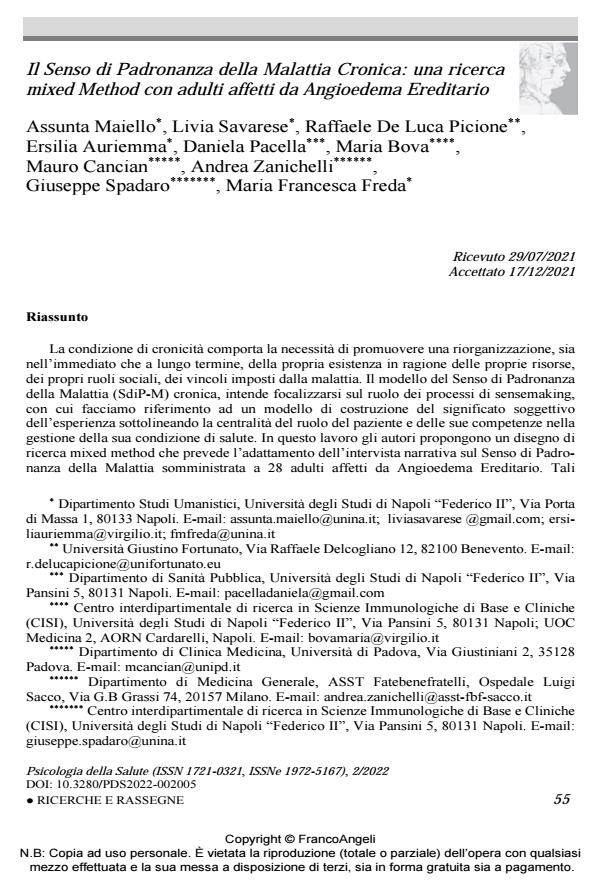Il Senso di Padronanza della Malattia Cronica: una ricerca mixed Method con adulti affetti da Angioedema Ereditario
Titolo Rivista PSICOLOGIA DELLA SALUTE
Autori/Curatori Assunta Maiello, Livia Savarese, Raffaele De Luca Picione, Ersilia Auriemma, Daniela Pacella, Maria Bova, Mauro Cancian, Andrea Zanichelli, Giuseppe Spadaro, Maria Francesca Freda
Anno di pubblicazione 2022 Fascicolo 2022/2
Lingua Italiano Numero pagine 25 P. 55-79 Dimensione file 311 KB
DOI 10.3280/PDS2022-002005
Il DOI è il codice a barre della proprietà intellettuale: per saperne di più
clicca qui
Qui sotto puoi vedere in anteprima la prima pagina di questo articolo.
Se questo articolo ti interessa, lo puoi acquistare (e scaricare in formato pdf) seguendo le facili indicazioni per acquistare il download credit. Acquista Download Credits per scaricare questo Articolo in formato PDF

FrancoAngeli è membro della Publishers International Linking Association, Inc (PILA), associazione indipendente e non profit per facilitare (attraverso i servizi tecnologici implementati da CrossRef.org) l’accesso degli studiosi ai contenuti digitali nelle pubblicazioni professionali e scientifiche.
La condizione di cronicità comporta la necessità di promuovere una riorganizzazione, sia nell’immediato che a lungo termine, della propria esistenza in ragione delle proprie risorse, dei propri ruoli sociali, dei vincoli imposti dalla malattia. Il modello del Senso di Padronanza della Malattia (SdiP-M) cronica, intende focalizzarsi sul ruolo dei processi di sensemaking, con cui facciamo riferimento ad un modello di costruzione del significato soggettivo dell’esperienza sottolineando la centralità del ruolo del paziente e delle sue competenze nella gestione della sua condizione di salute. In questo lavoro gli autori propongono un disegno di ricerca mixed me-thod che prevede l’adattamento dell’intervista narrativa sul Senso di Padronanza della Malattia somministrata a 28 adulti affetti da Angioedema Ereditario. Tali interviste sono state analizzate mediante un approccio theory driven volto ad esplorare le modalità attraverso cui si declinano le cinque funzioni della narrazione: articolazione temporale, integrazione dell’esperienza nella quotidianità, regolazione delle emozioni, supporto sociale e fronteggiamento. Mediante una Multiple Corrispondence Analysis ed una successiva cluster analysis sono stati identificati tre differenti profili di padronanza che rappresentano diversi gradi di flessibilità, integrazione e adattamento alla malattia. I risultati suggeriscono come la qualità di vita sia legata alla promo-zione dei processi che sono coinvolti nel SdiP-M, i quali appaiono di vitale importanza per sostenere l’engagement dell’individuo e del sistema sanitario che se ne fa carico.
Parole chiave:malattia cronica, intervista narrativa, processo di sensemaking, engagement.
Assunta Maiello, Livia Savarese, Raffaele De Luca Picione, Ersilia Auriemma, Daniela Pacella, Maria Bova, Mauro Cancian, Andrea Zanichelli, Giuseppe Spadaro, Maria Francesca Freda, Il Senso di Padronanza della Malattia Cronica: una ricerca mixed Method con adulti affetti da Angioedema Ereditario in "PSICOLOGIA DELLA SALUTE" 2/2022, pp 55-79, DOI: 10.3280/PDS2022-002005